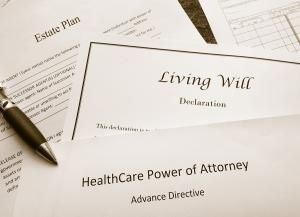Storing Your Important Estate Documents

While perhaps not the most pleasant topic to think about, your estate planning should not be forgotten. After someone passes away, their spouse, child(ren), and/or other trusted individuals need to access an array of documents. The sooner this can be done, the better. You don’t want your estate held in probate because your documents are locked up in a manner that no one can access them. Not only does this lead to delays and problems, it can cause unneeded stress on your loved ones, who are already dealing with your loss.
With this in mind, the following are some tips on what you should do to make sure your estate documents are properly stored and accessible.
Every good plan starts with a list. Make a list of all your estate documents. These may include, but are not limited to: wills, living wills, health care proxies, insurance policies, financial powers of attorney, deeds to cemetery plots, and information regarding your financial assets.
Include contact information. Be sure to list current contact information for your estate attorney, CPA, insurance agents, financial advisor, banker, and any other professional that manages an account held in your name. It can also be a good idea to include names and contact information for family members in case not everyone is close.
Don’t forget computer access. Write down your current login information, passwords, and website addresses for your investment accounts and anything else accessible online. If you update your login information, be sure to update your list. Also include your password to your email in case any login information needs to be reset, as your email usually needs to be accessed to do this.
Where to keep? Once your list is completed, make sure a couple of people know where it is, as well as the location of all of your documents. You could give copies to your loved ones, or keep them in a desk drawer at home. Consider keeping them in a fire safe, but make sure your trusted loved one(s) has the combination.
A bank safe deposit box is not usually a good idea for your documents – the box may not be accessible when it needs to be due to banking hours, some banks actually seal safe deposit boxes at death, and the very document that would allow someone to access your safe deposit box may be in the box itself.
Virtual storage. If all this paper has your head spinning, a virtual document storage service may be a good option for you. This way your documents are accessible from anywhere, 24/7. You can house all of your documents online, or just ones that may need immediate access. For example, www.docubank.com is a service specifically for immediate access to healthcare directives and emergency medical information. You can find a plethora of other virtual document storage services through an online search.
Other document safe-keeping. You may want to keep other important documents with your estate planning documents. These could include marriage, death, and adoption certificates; deeds and mortgage contracts; letters to loved ones; ethical wills; and recent bank and investment account statements.
One last thought. Ask your estate planning attorney if they retain signed originals, and how long they do so. If any of your documents should go missing, it’s good to know they have a backup. Give them contact information for who should be able to access your documents.
